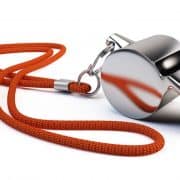|
Getting your Trinity Audio player ready...
|
Justice minister Ronald Lamola has paid tribute to South Africa’s whistle-blowers. Speaking on 6 February at the hybrid conference on Countering the Corrupt – Reform of the Criminal Justice Administration in South Africa, Lamola said: “You are the true embodiment of the famous saying by British philosopher John Stuart Mill: ‘Bad men need nothing more to compass their ends, than that good men should look on and do nothing.’ You are the good people who refused to look on and do nothing.”
However, the cost that whistle-blowers pay in their personal and professional lives is “counter-intuitive to the laudable goals of whistle-blowing, which are in the main to mainstream integrity and expose unethical organisational cultures through detection and protection”.
Lamola acknowledged that in the context of whistle-blowing as a weapon in the anti-corruption fight, there is a gap in the overall intention of what the Protected Disclosures Act seeks to do.
“One of the gaps we have identified is the fact that companies or government departments who are implicated by whistle-blowers are not held accountable for victimising whistle-blowers. The second gap we have identified is how we can transition whistle-blowers into witnesses in criminal cases where possible.”
One of the recommendations of the Zondo commission – presented in the first report handed over in January 2022 – was that a “fixed percentage of monies recovered should be awarded to the whistle-blower”.
In direct response to this recommendation, said Lamola, comparative research is being done on providing incentives for whistle-blowers.
“The review of South Africa’s anti-corruption architecture discussion document, which highlights the mandates of the various entities engaged in the fight against corruption, compares this with a comparative international benchmark and points to an outdated legal framework.”
Consideration is also being given to the creation of an anti-corruption entity, he said – this is another of the Zondo commission’s recommendations. “This work will be the culmination of research and discussions that have been ongoing for the past two years.”
Greater law enforcement collaboration good for SA
Lamola said that gains made in collaboration between South Africa’s law enforcement agencies is resulting in a more efficient approach to the country’s fight against fraud and corruption.
He said a siloed approach to fighting corruption was identified as a weakness in the criminal justice system, and steps were taken to address it.
“Today, we see greater levels of collaboration and co-ordination between the Investigative Directorate, Asset Forfeiture Unit, the Specialised Commercial Crime Unit, Special Investigating Unit and the Directorate for Priority Crime Investigation.”
Lamola illustrated the benefits of the closer inter-agency working relationship, saying that between April and December 2022, the Anti-Corruption Task Team enrolled 35 cases in court involving 180 accused. In addition, the Investigating Directorate enrolled 32 cases, with 187 accused individuals appearing in court, for alleged state capture-related offences.
As a result of this work, Lamola said, R12.5-billion has been recovered so far.
“This is not something to be scoffed at. It is proof that accountability is happening as we speak.”
The minister emphasised the importance of law enforcement agencies performing optimally in South Africa’s democracy and society. “When law enforcement agencies fail to perform we are judged as a country by international financial institutions such as rating agencies, the Financial Action Task Force (FATF), and so on.”
The threat of grey-listing by FATF, the outcome of which will be known later this month, will have a “dire effect on our economy and ability to raise funding in the international markets”, should it come to pass, said Lamola.








